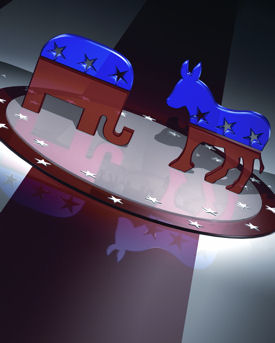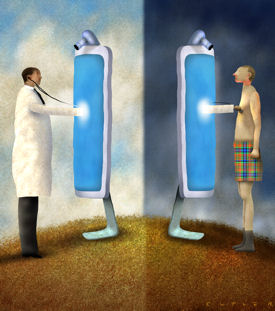Presidential candidates need to leap generation gaps
Do generational differences affect presidential politics?.
As this issue's cover story explains, generational differences can have a significant impact on working relationships and career decisions. But do they also affect presidential politics?
To answer that question, I recently spoke with Linda Nazareth, an economist who has studied generational attitudes and the presidential candidates. She noted that generational differences are likely to be more of an issue in this election than in the past because of the range of generations represented by the candidates. If John McCain and Barack Obama are the general election nominees, they will present the greatest age difference—25 years—between presidential candidates in U.S. history.

So does that mean that members of the older “silent generation” will stick with Mr. McCain while the youngsters follow Mr. Obama? “It doesn't tend to work like that,” said Ms. Nazareth. She observed that historically baby boomers, in particular, have not shown overwhelming loyalty to candidates of their own generation, as evidenced by the current lack of support for our boomer president, George W. Bush, whose approval rate has hovered around 33% in recent months.
Thus far, however, Mr. Obama has been fairly successful in attracting youthful supporters to his campaign, with strong grassroots organizations on many college campuses. Born in 1961, he is technically a late baby boomer, but he has positioned himself in opposition to Hillary Clinton and other boomers. “If you're born after 1960, you probably don't feel like a baby boomer. He's the first Generation X candidate who we've seen with a realistic chance of becoming president,” said Ms. Nazareth.
The handover of the generational torch could also have implications for health care policy. Ms. Nazareth predicts that younger voters—members of Generation Y born after 1980—will be more willing to consider revisions to the employer-based health care system than their older peers.
“Generation Y wants more time. They want some time to do things besides work. That's expensive and hard to do unless benefits aren't completely tied to work,” she said.
Younger voters also have less to lose and more to gain in changing the health care system. Young adults make up a disproportionally large percentage of uninsured Americans. According to statistics from the Agency for Healthcare Research and Quality and the Department of Health and Human Services, 35% of Americans between the ages of 19 to 24 are uninsured and 63% of the overall uninsured population is under age 34.
Sure, younger voters are less likely to need health care, and therefore insurance, but it appears that even they are unsatisfied with the status quo. Throughout the fall, Americans under age 30 mirrored their older peers in naming health care as the second-most important issue in the election.
In a Super Tuesday exit poll in February, concerns about an impending recession knocked back Iraq and health care to take the top spot, but younger voters continued to focus at least as much and maybe a bit more on the health care issue than other groups (20% of 17-29 year olds named health care as their biggest concern vs. 19% of older voters). Not the environment or education but health care—that's a lot of attention for young, healthy people to pay to a relatively unglamorous issue.
Of course, the caveat in expecting younger generations to drive policy is that they tend not to vote. “Generation Y is a big, untapped voting block. Twenty-somethings haven't been that active politically, especially in terms of voting,” said Ms. Nazareth. Statistics indicate that the trend might be turning around, however. The percentage of under-25-year-old voters increased more than 10% in 2004 over 2000 and primary voting has taken another jump this year, rising between 1% and 7% in the Super Tuesday states.
Ms. Nazareth also predicts that baby boomers will get more politically active, as retirement leaves them more time for involvement in lobbying and nonprofit activities. Health care policy, especially the viability of Medicare, will also likely grow in importance for them. For the moment, current Medicare beneficiaries hold an outsized grip on electoral power, but it seems that the impact of younger generations may be felt as soon as this November.
It's less clear what the net effect on health care policy would be. Younger voters in general tend to skew Democratic, and Mr. Obama's groundswell of support would indicate that they are continuing to do so, but both Democratic and Republican candidates claim that their proposals will improve life for uninsured Americans and offer something other than the current employer-based system of health care. Who will be more convincing? We'll just have to wait and see.



